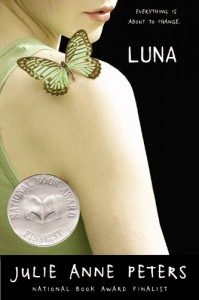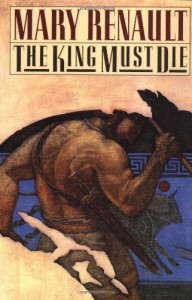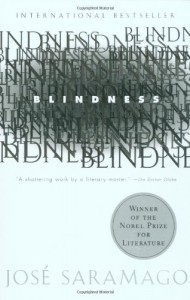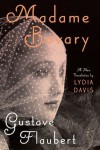Currently reading
Madame Bovary
Siddhartha
Civil Disobedience and Other Essays (Collected Essays)
The Children Star
Manstealing for Fat Girls
Undersong: Chosen Poems Old and New
Radio Crackling, Radio Gone
Radiant Days
Mythmakers and Lawbreakers: Anarchist Writers on Fiction
Footnotes in Gaza
Luna
 Usually I would be pretty excited about a book about a trans teen, and I did stay up until I finished this novel, but there was something unsatisfying about Luna for me. Maybe the choice to tell the story from the POV of the transkid's straight, cis-gendered sister? Also the parents seemed cartoonish. There were moments that felt real. I don't know.
Usually I would be pretty excited about a book about a trans teen, and I did stay up until I finished this novel, but there was something unsatisfying about Luna for me. Maybe the choice to tell the story from the POV of the transkid's straight, cis-gendered sister? Also the parents seemed cartoonish. There were moments that felt real. I don't know.
The King Must Die: A Novel
 I remember reading the Mary Renault books as a kid and being very excited by the gay bits, and I was recently reminded of this by a middle-schooler of my acquaintance, who enthusiastically recommended Renault to me. So we'll see. So far so good. Something I didn't recall: Theseus is short!
I remember reading the Mary Renault books as a kid and being very excited by the gay bits, and I was recently reminded of this by a middle-schooler of my acquaintance, who enthusiastically recommended Renault to me. So we'll see. So far so good. Something I didn't recall: Theseus is short!
Little Brother
 I just read this entire book online, because Doctorow is doing a very cool Creative Commons license publishing strategy. Anyway, I'd never read an entire novel online before but it was a good experience, in part because the book was gripping, funny, and smartly political. Also, Doctorow has loaded the book with practical information on escaping state surveillance. Talk about the Dangerous Book for Whoever!A note to my friends: I was turned off in the first few pages by the narrator's glib and fetishy descriptions of "tranny hookers" in the Tenderloin, but persevered and came to see the narrator as a sheltered white middle class teen, and the fetishy language as indicative of that. I think what turned it around for me was a pretty well-handled scene when the narrator (whose handle is "M1k3y," ha) is confronted about his white privilege by one of his hacker friends.
I just read this entire book online, because Doctorow is doing a very cool Creative Commons license publishing strategy. Anyway, I'd never read an entire novel online before but it was a good experience, in part because the book was gripping, funny, and smartly political. Also, Doctorow has loaded the book with practical information on escaping state surveillance. Talk about the Dangerous Book for Whoever!A note to my friends: I was turned off in the first few pages by the narrator's glib and fetishy descriptions of "tranny hookers" in the Tenderloin, but persevered and came to see the narrator as a sheltered white middle class teen, and the fetishy language as indicative of that. I think what turned it around for me was a pretty well-handled scene when the narrator (whose handle is "M1k3y," ha) is confronted about his white privilege by one of his hacker friends.
The Sparrow
 The elevator pitch is just funny: "Jesuits in Outer Space!" but this book is actually really interesting and smart. It makes a lot of sense to me to look at what happens to religious seekers when confronted with sentient life on other planets. The novel is more about trauma and recovery than it is about the alien culture, which was somewhat disappointing to me but made sense. I heard there's a sequel, which I'm excited about. So that tells you something.
The elevator pitch is just funny: "Jesuits in Outer Space!" but this book is actually really interesting and smart. It makes a lot of sense to me to look at what happens to religious seekers when confronted with sentient life on other planets. The novel is more about trauma and recovery than it is about the alien culture, which was somewhat disappointing to me but made sense. I heard there's a sequel, which I'm excited about. So that tells you something.
Blindness (Harvest Book)
 Just finished this today, not sure what I think. Saramago's treatment of women characters seems facile to me, objectifying. Also, maybe the use of the state of blindness as a metaphor for anything is kind of creepy. I need to think more about this. Anybody read it?
Just finished this today, not sure what I think. Saramago's treatment of women characters seems facile to me, objectifying. Also, maybe the use of the state of blindness as a metaphor for anything is kind of creepy. I need to think more about this. Anybody read it?
The Stone Gods
 It's uneven. The first 98 pages would have made a fine novella, and I'm sad it didn't stop there. The rest of the book is brilliant in the way that Jeanette Winterson is brilliant, and the very end of the book is also interesting. Ultimately this is disappointing to me, and I think will be disappointing to anyone who's read more than one or two science fiction books in their lives.
It's uneven. The first 98 pages would have made a fine novella, and I'm sad it didn't stop there. The rest of the book is brilliant in the way that Jeanette Winterson is brilliant, and the very end of the book is also interesting. Ultimately this is disappointing to me, and I think will be disappointing to anyone who's read more than one or two science fiction books in their lives.
Twilight (The Twilight Saga, Book 1)
 My young charges at camp this summer were obsessed with this series, so I decided to see check it out. I mean, I enjoyed Anne Rice books very much as a youth, and love Octavia Butler's Fledgling, so I thought I might find some actual pleasure in this teen-vampire book. No such luck. One of the primary pleasures of vampire stories for me is the pleasure of the passing narrative, and this series doesn't really indulge. The vampires are not very cagey at all, just extraordinarily good at everything they do, rich, generous, possessed of a moral compass, and also extremely pretty (we're told). The most distracting problem for me, besides the shockingly bad prose, was Meyer's uncritically-applied racist standards of beauty. The vampires and the vampire-chaser are all especially beautiful because of their extraordinarily white skin. Yuck!
My young charges at camp this summer were obsessed with this series, so I decided to see check it out. I mean, I enjoyed Anne Rice books very much as a youth, and love Octavia Butler's Fledgling, so I thought I might find some actual pleasure in this teen-vampire book. No such luck. One of the primary pleasures of vampire stories for me is the pleasure of the passing narrative, and this series doesn't really indulge. The vampires are not very cagey at all, just extraordinarily good at everything they do, rich, generous, possessed of a moral compass, and also extremely pretty (we're told). The most distracting problem for me, besides the shockingly bad prose, was Meyer's uncritically-applied racist standards of beauty. The vampires and the vampire-chaser are all especially beautiful because of their extraordinarily white skin. Yuck!
The Living One: A Gothic Thriller
 For some reason I was thinking about this book today, and I was remembering reading it on the beach in Provincetown in the early 90s. I loved it so much! I am scared to re-read it. What I remember is florid gay prose like a Pierre et Gilles photo, or Fassbinder for young adults.
For some reason I was thinking about this book today, and I was remembering reading it on the beach in Provincetown in the early 90s. I loved it so much! I am scared to re-read it. What I remember is florid gay prose like a Pierre et Gilles photo, or Fassbinder for young adults.
Good as Lily (Minx Graphic Novels)
 I am crazy for Derek Kirk Kim, and even though Good As Lily is not as well-written or drawn as Same Difference, it's better than any of the other Minx books and better than most comix this year.
I am crazy for Derek Kirk Kim, and even though Good As Lily is not as well-written or drawn as Same Difference, it's better than any of the other Minx books and better than most comix this year.
Life Sucks
 I'm a Jessica Abel fan, and I like supernatural stories, but this is not her best work. Among other things, why didn't she draw as well as write? She's a far more appealing artist than the guy they got to do it. Ultimately the story is thin.
I'm a Jessica Abel fan, and I like supernatural stories, but this is not her best work. Among other things, why didn't she draw as well as write? She's a far more appealing artist than the guy they got to do it. Ultimately the story is thin.
The New York Four
 The latest in the new Minx series of graphic novels targeted at teenage girls and created by (straight bio) men. The state of comix tempts me into gender essentialist critique. I guess the real question is why don't publishers like DC Comics hire more women graphic novelists? More on this later.
The latest in the new Minx series of graphic novels targeted at teenage girls and created by (straight bio) men. The state of comix tempts me into gender essentialist critique. I guess the real question is why don't publishers like DC Comics hire more women graphic novelists? More on this later.
Middlesex: A Novel
 What even made Eugenides think he could write this book? So clueless! So infuriating! Years after I read this I'm still sputtering mad. He manages to simultaneously reify the binary gender system, rip off Michael Cunningham's Flesh & Blood, and locate the origin of intersex bodies in an incest narrative. WTF!?
What even made Eugenides think he could write this book? So clueless! So infuriating! Years after I read this I'm still sputtering mad. He manages to simultaneously reify the binary gender system, rip off Michael Cunningham's Flesh & Blood, and locate the origin of intersex bodies in an incest narrative. WTF!?
How We Are Hungry
 My favorite piece in this collection is a utopian story called "Your Mother and I," which I first encountered at a big group reading Eggers participated in at El Rio a few years ago.
My favorite piece in this collection is a utopian story called "Your Mother and I," which I first encountered at a big group reading Eggers participated in at El Rio a few years ago.
















